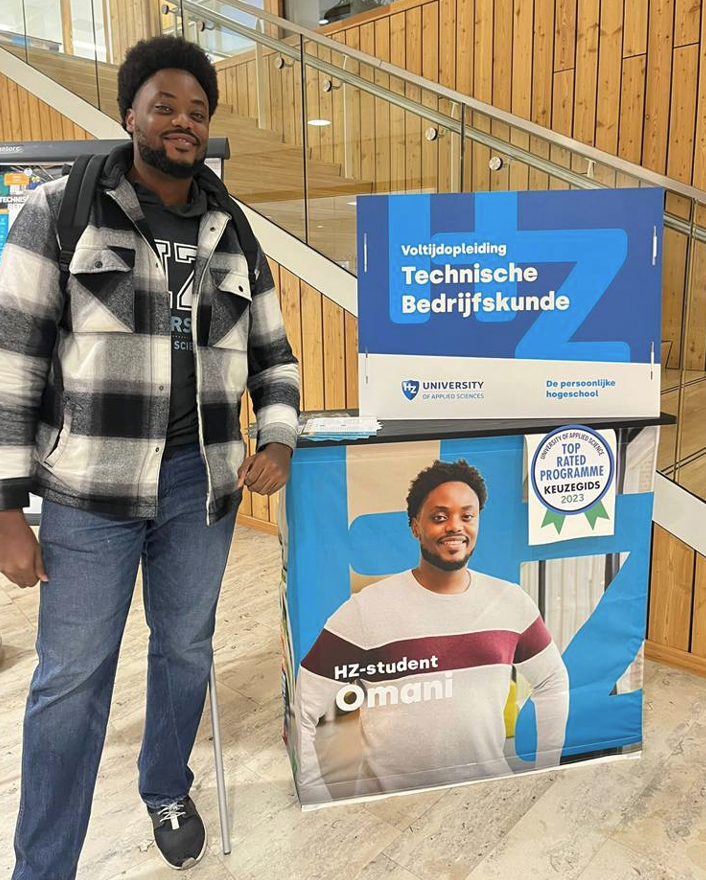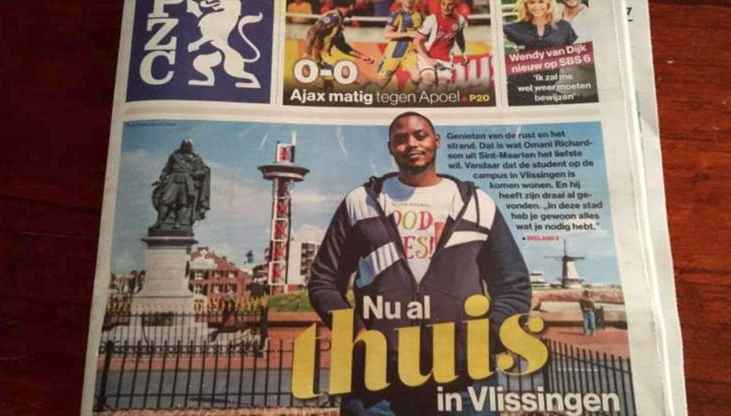Omani Richardson has just joined BDO St. Maarten as a junior consultant in digital advisory. He returns with a Master’s in Digital Transformation and a clear idea of how data, process discipline, and practical tools can help local firms compete. He reads the global trends, he keeps a simple rule, start where the work already is, then scale what proves value.
He traces that mindset to his studies and early internships. “I left for the Netherlands in 2019 to pursue my Industrial Engineering & Management bachelor’s in Middelburg Zeeland. At the time this study was only offered by two HBO universities in the Netherlands. I chose to study at HZ University because it’s a mid-sized offering a hands-on study which allowed us to attend 3 days of class and 2 company days where we focused on projects related to our subjects.
During my studies I completed an internship at PJIAE in 2022 for the Project Management Unit and my last internship was in 2025 as a continuous improvement intern for Winair. What led me to pursue my Master’s was the amount of data that companies already work with. During my time in the Netherlands, I witnessed a company completely restructure to become more data driven and I was impressed by the way this affected their strategy, they had the same vision but they recognized that a change was needed to stay competitive in their market. That process inspired me to pursue a Master’s that would put me in a position to influence change on that level, which led me to Digital Transformation from the University of Barcelona.”

What digital transformation means in practice
For many, the term sounds abstract. Richardson keeps it simple and sequential. “Digital Transformation is a broad topic, it is considered a strategic shift that uses digital technology at its core, but it can be broken down in three phases:
Digitization – During this phase physical assets are converted to data, something as simple as scanning a document is considered digitization. It might sound simple but it lays the foundation for innovation and in 2025 data is comparable to gold.
Digitalization – This phase builds on digitization, the data is now being used by digital tools to improve processes. This is where things like advanced software, cloud computing and automation come into the picture.
Digital Transformation – This is when a ‘digital-first’ approach is used, entire strategies, products and services are created around a digital infrastructure. An example can be a store in town introducing online services allowing customers to buy online and ship to their customers.”
That stepwise view guides how he reads opportunities on a small island economy. Start with data capture, build basic visibility with dashboards, move routine processes to reliable systems, then change the business model where the evidence supports it.
Where the spark came from
His interest sharpened when real projects demanded both engineering and data skills. “I think my internships really got me more interested in this field, I’ve seen project managers basically program and work with data to keep up with digital shifts in their markets. Luckily industrial Engineering was broad enough to teach me the basics of process improvement while equipping me with digital skills. I was always interested in technology but my studies really helped me apply myself and turn that interest into contribution.”
Reading the wave from a small market
Island firms face tight margins and limited staff. That raises the cost of delay. Richardson’s view is direct. “Businesses on Sint Maarten will be affected by digital transformation, in my opinion they should track international trends and see how they can benefit before it reaches a point where they lose trust and are late to react. Technology is moving at a speed that we have never seen before and data is driving innovation, companies in larger countries have adapted enterprise resource planning (ERP) systems, dashboarding and cloud computing.”
The message is not to chase every tool. It is to watch the curve, select systems that fit the scale of the firm, and measure outcomes so leaders can see where to invest next.
Why BDO, why now
Richardson chose BDO for its platform and willingness to train for local needs. “What drew me to BDO is their focus on professional advancement, they pay attention to the developments on the island and are willing to offer trainings to fill certain gaps in the market, as a person that believes that learning is a lifelong journey my values align well with their core values. I look forward to contributing to a stronger and more secure digital environment in the private and public sector on the island through my role as a junior consultant for digital advisory.”
That agenda lines up with a simple set of early wins for St. Maarten’s firms, clean data capture, basic analytics, cloud services that reduce downtime, and controls that protect customer trust.

The person behind the plan
Studying abroad demands focus and patience. Richardson credits his support system and steady habits. “A few things kept me grounded during my studies, the main thing was a strong support system from my family back home, friends that I made during my studies and faith that things will work out. I usually try to focus on the big picture, so I celebrated the small wins, tried to learn from my mistakes and saw every day as new opportunity to move closer to my goals.”
He makes room for life outside of work as well. “There’s always a compromise when trying to find that balance, for me I spend more time either working or studying so I’m not playing as much basketball as I would like right now, hopefully one day we can grow to a point where we can take part in a one of the business competitions though. As for travel I won’t be doing as much as my time in Europe but I still plan to visit a few neighbor islands during my vacations.”
A line he keeps in mind comes from management thinker Peter Drucker. “That quote by Peter Drucker: ‘The best way to predict the future is to create it’ — what does it mean to you personally?
That quote really stands out to me because it is impactful, direct and empowers others. I do not believe there is a perfect time to begin working towards a better future, sometimes we just need to start building it.”
Guidance for young professionals
The island needs more people who can blend process, data, and product thinking. Richardson offers a simple playbook. “My advice is to start growing your network, find people that are as passionate about innovation as yourself and brainstorm with them. Try to keep up with trends on the island, in the region and internationally, this helps you plan ahead and what you thought were problems slowly start to look like opportunities. Lastly, I advise our young professionals to start working on portfolios and getting certifications in the field that you are most passionate about, our fields are going to get more competitive in the next few years and the more you can differentiate the better.”
Looking ahead
His focus now is to translate interest into projects that help firms move without disruption. “I like some of the discussions that I have heard on the island so far in terms of innovation, personally I am excited about fintech advancements. The size of our island and our access to multiple markets gives us a unique selling point for future blockchain advancements, if or when this happens, I would like to help the private sector adapt to this shift in the safest way possible without disrupting their operations.”
That mix of caution and intent fits the moment. St. Maarten’s businesses face rising customer expectations, tighter security requirements, and pressure to do more with lean teams. Richardson’s story shows a practical way forward, build the data base layer, link it to the processes that matter, and use evidence to make the next move.
Join Our Community Today
Subscribe to our mailing list to be the first to receive
breaking news, updates, and more.



.jpg)


